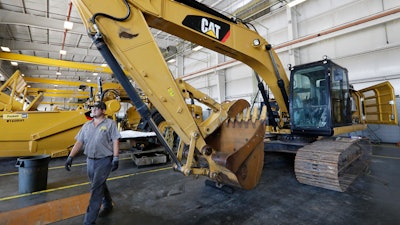
Heavy equipment and machinery manufacturer Caterpillar announced Thursday that it is temporary suspending certain US facilities as a result of the COVID-19 pandemic’s impact on the company’s supply chain.
Deerfield, IL-based Caterpillar said the virus’ continued spread is starting to impact its supply chain, which was a possibility the company disclosed in risk factors noted in the company’s most recent 10-K filing on Feb. 19.
 AP Photo/Rogelio V. Solis
AP Photo/Rogelio V. Solis
The company said it is committed to executing those plans and will remain in close contact with its supply chain to monitor future possible implications, especially on production facilities.
CAT is continuing to operate the majority of its US domestic operations and plans to continue operations in other parts of the world as local authorities permit. But the company said that due to uncertain economic conditions that have resulted in weaker demand, potential supply constraints and the spread of the pandemic and resulting government actions, the company is “temporarily suspending operations at certain facilities.”
The company said it will continue to monitor the situation and may suspend operations at additional facilities as the situation warrants.
CAT added that its financial results for the first quarter and remainder of 2020 will be impacted by those factors and continued uncertainty caused by COVID-19, and as a result, the company is withdrawing its most recent 2020 financial outlook included in its Jan. 31 8-K.
“To protect the safety, health and well-being of employees, customers, dealers, suppliers and communities, Caterpillar continues to implement several preventive measures while also meeting the needs of global customers,” the company stated. “They include increased frequency of cleaning and disinfecting of facilities, social distancing practices, remote working when possible, restrictions on business travel, cancellation of certain events and limitations on visitor access to facilities.”





















